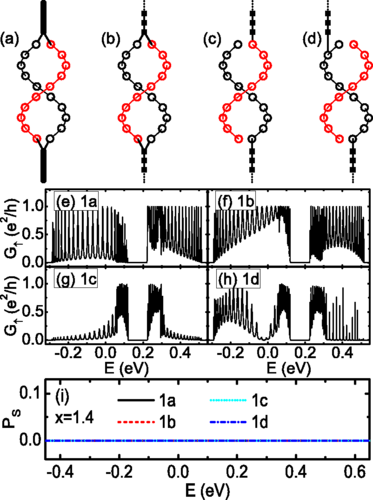We report on spin transport along double-helical molecular systems by considering various contact configurations and asymmetries between the two helical strands in the regime of completely coherent charge transport. Our results reveal that no spin polarization appears in two-terminal molecular devices when coupled to one-dimensional electrodes. The same holds in the case of finite-width electrodes if there is a bottleneck of one single site in the system electrode-molecule-electrode. Then, additional dephasing is necessary to induce spin-filtering effects. In contrast, nonzero spin polarization is found in molecular devices with multiple terminals or with two finite-width electrodes, each of them connected to more than one site of the molecule. The magnitude of spin polarization can be enhanced by increasing the asymmetry between the two strands. We point out that the spin-filtering effects could emerge in double-helical molecular devices at low temperature without dephasing by a proper choice of the electrode number and the connection between the molecule and the electrodes.

We report on spin transport along double-helical molecular systems by considering various contact configurations and asymmetries between the two helical strands in the regime of completely coherent charge transport. Our results reveal that no spin polarization appears in two-terminal molecular devices when coupled to one-dimensional electrodes. The same holds in the case of finite-width electrodes if there is a bottleneck of one single site in the system electrode-molecule-electrode. Then, additional dephasing is necessary to induce spin-filtering effects. In contrast, nonzero spin polarization is found in molecular devices with multiple terminals or with two finite-width electrodes, each of them connected to more than one site of the molecule. The magnitude of spin polarization can be enhanced by increasing the asymmetry between the two strands. We point out that the spin-filtering effects could emerge in double-helical molecular devices at low temperature without dephasing by a proper choice of the electrode number and the connection between the molecule and the electrodes.
